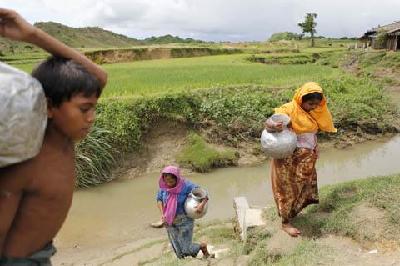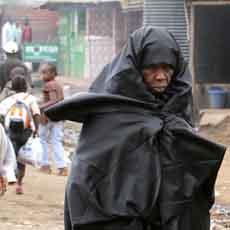"You can die as a stateless person and there is no record of your death because you do not exist, and therefore your death is an irrelevancy." says Erika Feller, UNHCR.
The UN High Commissioner for Refugees has launched a global campaign to raise awareness of the plight of millions of stateless people around the world. The UNHCR says an estimated 12 million people live in a legal limbo.
Because they have no nationality, stateless people often are denied the basic rights enjoyed by those who are citizens of a country, including the right to employment, housing, education and health care.

Oftoboy Kadibayeva is a 34-year old mother of four. Her oldest daughter is mentally handicapped and her youngest child has no birth certificate. She and her husband used to have Soviet passports, which were destroyed during the inter-ethnic violence that erupted in Kyrgyzstan in June 2010, rendering them stateless.
"Since I am a stateless person and do not have a passport, I have problems with updating proper documents for my children. Second, my daughter's social allowance documents are not valid anymore. I have to renew them, but since I do not have a passport, this is an issue. I cannot get a birth certificate for my youngest child. Since I am a stateless person and have no documents, I do not have proper access to medical care."
Stateless people have no nationality.
Therefore, countries usually deny them the protections and services available to citizens. People who are stateless often have no right to schooling or health care. They may not be able to own property, travel abroad, get married legally, or register the birth of a child-as in the case of Kadibayeva's youngest child. With few resources and few advocates, stateless people are considered some of the most vulnerable people in the world.
UNHCR's Assistant High Commissioner for Protection, Erika Feller, says stateless people live in a shadowy limbo. They are essentially invisible.
"People who are stateless people, that is people who do not have an effective nationality or a country that is prepared to exercise protection and consular services on their behalf, they are exceedingly vulnerable people. Why? Because they are a hidden population quite often."
Even when they die, Feller says their passing goes unnoticed. They are not issued a death certificate.
"You can die as a stateless person and there is no record of your death because you do not exist and therefore your death is an irrelevancy."

Feller says being stateless increases the risk of children being trafficked. They easily disappear because there is no record of them. She says stateless people are vulnerable to slavery, prostitution and other abuse. "For example, being recruited into armed forces or being subject to forced labor. Again, without the protection of the law, protection that a state responsible for you gives you, you are fair game."
There are various causes of statelessness. A major factor is often racial or ethnic discrimination. For example, Mauritania expelled around 75,000 Black Mauritanians in 1989.
Gender discrimination is another big cause of statelessness. Around 30 countries, including Morocco, Lebanon and Saudi Arabia, do not allow a mother, who is married to a foreigner, to pass her nationality on to her children.
Nationality also is lost through state secession.
Head of UNHCR Stateless Unit, Mark Manly notes in the early 1990s, more than half of the world's stateless lost their nationality because of the break-up of the Soviet Union and the Yugoslav Federation.
"It is important to point out that indeed many, many people have acquired...the nationality of one of these successor states. And, in the case of the Russian Federation, according to the Russian authorities, the figure would be over 500,000 people since 2003."
International treaties were developed in 1954 and 1961 to resolve statelessness of millions of people. They provide minimum standards of treatment and a legal framework to help states reduce statelessness.
The UNHCR is calling on more countries to sign up to these treaties and eliminate the legal barriers that create statelessness.
The UN agency notes Bangladesh, Brazil, Iraq, Vietnam, and Indonesia are some of the countries that have successfully amended their laws over the last decade to confer citizenship upon their stateless populations.
World Refugee Day given urgency by Arab Spring
'Lost Boys' of South Sudan lead diaspora voter registration drive
UN holds food crisis talks in Switzerland
Ivory Coast refugees settle in for long stay in Liberia
(来源:VOA 编辑:崔旭燕)
